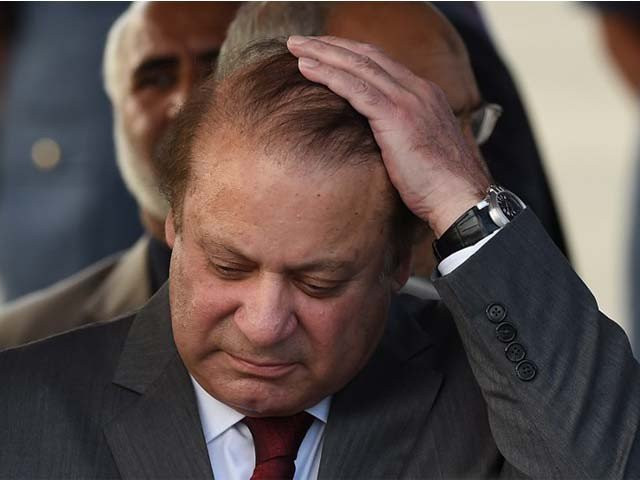Avenfield reference: Court reserves verdict on Sharif family plea seeking clarity on Wajid Zia's testimony
Sharif family seeks clarity on the extend of Wajid Zia's testimony in NAB references

Former Prime Minister Nawaz Sharif. PHOTO: AFP
The application, submitted by Nawaz Sharif’s lawyer Khawaja Haris was read out loud in the court-room on Tuesday by Co-counsel Saad Hashmi as the accountability court resumed hearing of the Avenfield Apartments reference wherein the Joint Investigation Team (JIT) head Zia, recorded his statement against the Nawaz, Maryam Nawaz and Captain [retd] Safdar.
Nawaz’s lawyer prayed to the court that “during the course of recording of evidence of Wajid Zia neither the report of the JIT nor any opinion formed nor inference drawn by the investigating officer can be brought on the record, being inadmissible under the law.”
Genuine parties, people to ensure free, fair polls, says Sharif
The application highlights that certain questions arose during the recording of Zia’s deposition regarding the admissibility of certain portions “he wished to bring on record and in this regard detailed arguments were submitted on behalf of the defence as well as the prosecution but till the instant date no written order has been passed by this honourable court while verbal observations have been made by which it may be gathered that this aspect of the matter may again be taken up by this honourable court after the witness has made his deposition with respect to the material collected by him during the course of investigation.”
During court proceedings, Maryam and Safdar’s lawyer, Advocate Amjad Pervaiz also expressed his reservations regarding the documents submitted by Zia, saying that the Jabal Ali Free Zone Authority documents were not attested by the notary public and diplomatic agent. Hence, these documents should not even be part of the courtroom's record.
Pervaiz stated that while the questions put before the JIT were framed by the Supreme Court (SC) during Panamagate hearings, the top court had not given any findings on it. He added that the SC did not direct NAB to file references on the basis of the findings of the JIT rather directed NAB to prepare and file references on the basis of the ‘material’ collected by the team.
He said the material collected by the JIT was not the final word, noting that fact and opinion were two different aspects. “Fact can be exhibited, the prosecution can rely on facts,” he said. “But opinion is an inference drawn by witness, it is what he thinks, his notion and estimation.”
He concluded that all facts presented before the court should fulfill the criteria laid down in the Qanoon-e-Shahadat [Law of evidence].
In his arguments, NAB Prosecutor Imran Shafiq stated that Zia had record his statement under section 161 of the Criminal Procedure Code (CrPC). He informed the court that the JIT head was appearing before the court as a witness rather than an investigating officer as argued by the defense counsel.
Shafiq said that collection of material was not limited to presenting documents before the court but how the witness collected the material. “He [Zia] can narrate how the documents were obtained.”
The NAB prosecutor further said that police and JIT reports were two separate documents.
Out of the documents submitted by Zia, only one document, i.e. Nawaz’s Iqama, t was admitted by the court while others were marked – produced before the court but not admitted as evidence after defense counsel raised objections. “He is neither the author nor has he collected the said documents himself,” they argued.
After hearing arguments from both sides, Judge Muhammad Bashir reserved the verdict and took a 15 minute break. Upon his return, he noted that announcing of the judgement may take longer than expected and decided to announce it tomorrow [March 21] instead.
Separately, Zia sought time to prepare for his testimony in Al Azizia and Flagship references. Informing the court that he was preoccupied with the Avenfield reference and did not get enough time to prepare his statements for the two references, he requested court to delay the hearing.
Accepting his plea, the court postponed the hearing in Al Azizia and Flagship references. However, the next hearing in Avenfield reference has been fixed for March 22 when Zia will continue to record his statement.
Accountability court excuses ‘unwell’ Nawaz
In the last hearing on March 16, Zia produced an ‘original’ letter of Qatari Prince Muhammad Bin Jasim al Thani obtained from the SC in a sealed envelope before the court to match with one of the photocopies of the prince’s letter he produced on March 15. However, it turned out to be different than the one submitted by the JIT chief a day earlier.
Pervaiz then raised objection over the admissibility of another letter by the Qatari prince. Subsequently, the court did not allow the letter to be exhibited as evidence and directed Zia to submit an application if he wanted to submit the letter as new evidence.
Zia and the National Accountability Bureau’s (NAB) prosecution team simply took back the letter after noting the development in day’s proceedings on defence counsel Pervaiz and Khawaja Haris’ request. Zia also presented several documents, including draft of the agreement held between Al Taufiq Company and Hudabiya Paper Mills, land registry of London flats and Nescol Company.
The court made the land registry of the Nelson and Nescol related to the London flat a part of the judicial record with defence counsels’ objections.



















COMMENTS
Comments are moderated and generally will be posted if they are on-topic and not abusive.
For more information, please see our Comments FAQ